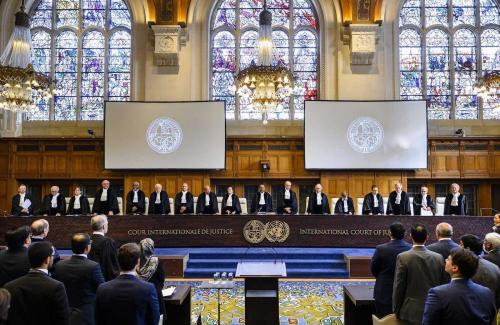
https://earth.org/icj-advisory-opinion-the-worlds-top-court-has-spoken-u....
Author:
Manleen Dugal
Manleen Dugal is an independent consultant (policy and law) on international environmental/climate change, trade and development policy matters. She has been an advisor to several WTO developing country members since 2004. Manleen has a Master’s degree in Environmental Law and Policy from Vermont Law School, a MSc in Development Economics from University of Manchester and a Masters in Trade Law and Economics from the World Trade Institute in Bern. Manleen is passionate about writing on environmental/climate change topics and conveying complex and multi-dimensional issues to a wider audience in an accessible manner.
The International Court of Justice’s advisory opinion on climate change, issued July 23, offers a chance to create a unified understanding of states’ climate obligations, transcending specific treaties and regional arrangements and cutting across the entire spectrum of international law. It provides authoritative guidance on how international law applies more broadly to the climate crises.
—
This article is part 3 of a three-part series looking at landmark, climate-related advisory opinions issued by international courts. Read part 1 (ITLOS) and part 2 (IACtHR).
Initiated by the Pacific Island nation of Vanuatu, the United Nations General Assembly (UNGA) Resolution A/77/L.58 – jointly sponsored by 132 developed and developing countries – formally requested an advisory opinion from the International Court of Justice (ICJ) concerning states’ legal duties on climate change.
It was the culmination of a six-year campaign initiated by the Pacific Island Students Fighting Climate Change (PISFCC), who, when faced with the existential threat of sea level rise, sought legal clarity on climate obligations through the world’s highest court.
The UNGA resolution specifically posed the following questions:
(a) What are the obligations of States under international law to ensure the protection of the climate system and other parts of the environment from anthropogenic emissions of greenhouse gases for States and for present and future generations?
(b) What are the legal consequences under these obligations for States where they, by their acts and omissions, have caused significant harm to the climate system and other parts of the environment, with respect to:
(i) States, including, in particular, small island developing States, which due to their geographical circumstances and level of development, are injured or specially affected by or are particularly vulnerable to the adverse effects of climate change?
(ii) Peoples and individuals of the present and future generations affected by the adverse effects of climate change?
More on the topic: Climate Change Is an ‘Existential Threat of Planetary Proportions’, Says World’s Top Court in Historic Ruling
ICJ Opinion: Highlights
The advisory opinion was hailed as a historic turning point in climate justice and accountability, with the ICJ unanimously affirming the entirety of Vanuatu’s submissions. Below are some key highlights.
Climate as an existential threat of anthropogenic nature
The court underscores that the consequences of climate change are “severe and far-reaching,” affecting both natural ecosystems and human populations. Climate change, it asserts, is an “urgent and existential threat” to humanity.
Moreover, the court confirms that greenhouse gas emissions are “unequivocally caused by human activities,” and observes that all parties to the proceedings accept the Intergovernmental Panel on Climate Change (IPCC) as the most authoritative source of scientific knowledge on the “causes, nature and consequences” of climate change.
The Paris Agreement goal of 1.5C
The ICJ confirms that limiting global warming to 1.5C is the primary temperature goal collectively embraced by Paris Agreement parties. This elevates 1.5C from an aspirational goal to a definitive legal benchmark governing the ambition, scope, and due-diligence duties of every state under both the Paris accord and general international law.
Complete reading on EARTH. ORG









